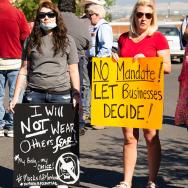Awash in early COVID-19 questions from anxious friends and relatives, a few mom scientists decided to pool their knowledge and share the burden of answering them. Dear Pandemic was born.
Eight months later, the website has become a vibrant education platform for an interdisciplinary team of female PhDs and clinicians. Tagged as “those Nerdy Girls” by an early follower, they sift through COVID-19 science, controversy and confusion to dish out advice for staying safe and, well, sane.
The chief nerd is Lindsey Leininger, the CEO of Dear Pandemic and an alum of the University of Chicago Harris School of Public Policy.
“I never could have anticipated 13 years ago using my Harris PhD to be on Facebook,” said Leininger, PhD’07, who teaches data-driven health policy at Dartmouth College’s Tuck School of Business. “It’s been a wild ride.”
With nearly 50,000 followers on Facebook alone, Leininger and her colleagues answer questions via posts and weekly live-stream sessions—with more than 600 archived by topic. It is work that embodies Harris principles precisely: science rooted in data and impact.
“We rapidly get smart on emerging data and evidence and then translate it, and that’s a tried and true Harris skill,’’ Leininger said.
So nerdy they’re cool, Dear Pandemic’s 12 researchers and clinicians have expertise covering nursing, mental health, demography, health policy and economics, and epidemiology. They’ve done hundreds of interviews as go-to sources, including for mainstream media organizations such as The New York Times, CNN, BBC and The Wall Street Journal.
“A pandemic is such a big intractable social problem that no one discipline is sufficient to tackle it, so I think our disciplinary breadth is pretty cool,’’ Leininger said. “We are testament to generalist training, like Harris or the business school at Tuck where I am now.’’
Sensible, practical and fun, they sound like moms. Among them, they have 22 children.
“I feel like we’re more relatable as a team because we are pandemic moms,’’ said Leininger, whose 5-year-old JoJo might twirl across the background of any given Zoom meeting while Max, 9, is downstairs engaged in a remote classroom. In other words, she is juggling too, and it’s not easy.
Dear Pandemic’s posts may especially resonate with parents, but they can help anyone hoping to sort through questions about scientific controversy and mental health.
Most common are lifestyle questions, such as: “If someone in my household has COVID-19, what are the chances I get it, too?” (Here’s the answer.) Masks are discussed regularly, and from every imaginable angle.
Leininger handles the “information hygiene” beat, striving to counteract misinformation, conspiracy theories and bad data. “I do a lot on media literacy and being a good critical consumer of data and evidence and the claims that you see in the news,” she said. “It’s very Harris.”
Asked recently about “the hallmarks of high-quality reporting,” Leininger’s short answer was to “look for the ABCs of ethical journalism: Accountability; Balance; and Credibility.” For every question, there’s always a longer answer, written in Dear Pandemic’s trademark style: clear, concise, smart, and a little bit funny or snappy.
Two Nerdy Girls also host regular live-streamed Facebook conversations to answer questions submitted in advance. (They don’t take live questions because they want the opportunity to consider the science before answering.) In a recent session with Dear Pandemic co-founder Malia Jones, an epidemiologist at the University of Wisconsin-Madison, Leininger tackled a question about restaurant dining options as cold weather takes hold.
“I think of these plastic, enclosed dining domes and every ounce of my public health scientist being goes ‘ARGH,’” said Leininger, waving her arms. “That’s my short answer—ARGH!”
Mental health and wellness, including “pandemic fatigue,” are important to the Dear Pandemic mission as well.
“It’s real,” Leininger said. “This chronic angst basically is very bad for our brains. And cognitive scientists have shown it really impairs our decision-making.” This leads to everything from bad food choices to lack of vigilance in wearing masks and social distancing.
Dear Pandemic gives Leininger a way to cope with pandemic fatigue, but simpler measures can work too. “It doesn’t have to be as grand as launching a public health campaign,” she said. “It can be, ‘My neighbor is sick and needs their dog walked, and that gets me out of bed every morning and it’s a way I can contribute.’”
Leininger brings a rare mix of skills to Dear Pandemic: management experience coupled with public policy and data analytics expertise. As a high school student, she took part in community service projects in Latin America. Digging latrines in Mexico and vaccinating dogs and cats against rabies in Ecuador became what she called “my first awakening that public health is a force in the world.’’
Growing up in Texas, she said, has also made her more effective in the policy world: “So many people in this profession are pretty liberal. Most of the people I knew growing up are quite conservative. And so I think it’s just kind of easy for me to build bridges across the political aisle.’’
Dear Pandemic is decidedly non-partisan. In a recent Washington Post opinion piece—co-authored with Prof. Harold Pollack of the School of Social Service Administration—Leininger addressed the need for public health experts to do a better job talking to conservatives.
After graduating from Harris, Leininger did postdoctoral work at the University of Wisconsin-Madison—spending half of her week doing translational research, and half working in cubicles at the state’s Medicaid agency. She then found her way back to Chicago, where she spent eight years focusing on research for Medicaid policymakers. That included a stint as a staff scientist at University of Chicago’s Chapin Hall, which seeks to improve the lives of children through rigorous analysis of data-driven research.
Joining the Dartmouth business school in 2018 might have seemed an odd move. But Leininger teaching intersects public health, analytics and the health care industry, which accounts for 20% of the U.S. GDP. “It’s not as weird a fit for me as it might actually seem,” she said.
Leininger’s husband, Brian Melzer, PhD’08, is an economist at Tuck. They met at Princeton and became grad school sweethearts at the University of Chicago—she at Harris, and he at the Booth School of Business.
Rather unintentionally, Leininger now finds herself in charge of what essentially is a media brand. While Jones acts as editor-in-chief, establishing voice and style, Leininger leads management and strategy. As CEO, she eyes external partnerships, including other scientists whose work can be highlighted on the platform. Dear Pandemic established its first and closest strategic partnership with a team of Chicago-based physicians led by Prof. Vineet Arora of UChicago Medicine, whom Leininger met at Harris.
Leininger recently secured grant funding to create new content for racial and ethnic minorities disproportionately affected by the pandemic. A fellowship from the Robert Wood Johnson Foundation will bring an early-career Black scientist to the team.
She also hopes her work can further amplify female voices, including through appearances for the Nerdy Girls at scientific conferences.
“Lifting up female scientists is something of a true labor of love for me,’’ Leininger said. “I am deeply committed to developing these women to be the face of science in the media going forward.’’
Leininger doesn’t see herself doing this kind of work forever, describing herself as “a die-hard data educator and policy wonk.’’ Then again, she’d never imagined launching Dear Pandemic in the first place. Whatever comes next, she hopes her non-traditional path is inspiring and instructive.
“I hope Harris students are brave enough to chart their own paths, to break the rules,’’ Leininger said. “I just know that I would not trade my training for any else’s right now.’’
—A version of this story was first published by the Harris School of Public Policy.

